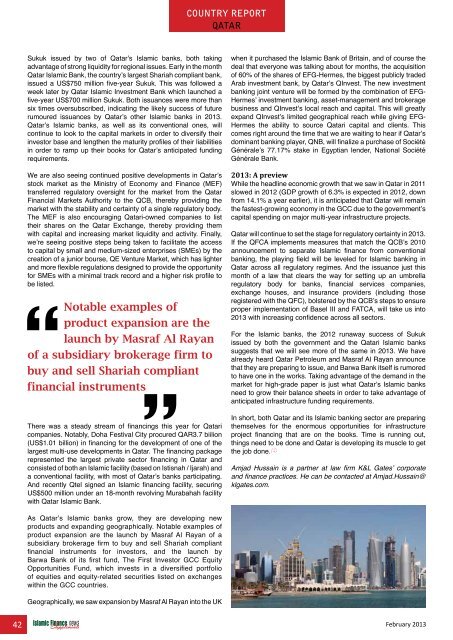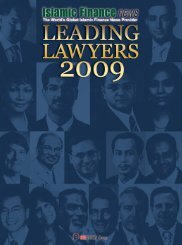View PDF Edition - Islamic Finance News
View PDF Edition - Islamic Finance News
View PDF Edition - Islamic Finance News
Create successful ePaper yourself
Turn your PDF publications into a flip-book with our unique Google optimized e-Paper software.
country report<br />
Qatar<br />
Sukuk issued by two of Qatar’s <strong>Islamic</strong> banks, both taking<br />
advantage of strong liquidity for regional issues. Early in the month<br />
Qatar <strong>Islamic</strong> Bank, the country’s largest Shariah compliant bank,<br />
issued a US$750 million five-year Sukuk. This was followed a<br />
week later by Qatar <strong>Islamic</strong> Investment Bank which launched a<br />
five-year US$700 million Sukuk. Both issuances were more than<br />
six times oversubscribed, indicating the likely success of future<br />
rumoured issuances by Qatar’s other <strong>Islamic</strong> banks in 2013.<br />
Qatar’s <strong>Islamic</strong> banks, as well as its conventional ones, will<br />
continue to look to the capital markets in order to diversify their<br />
investor base and lengthen the maturity profiles of their liabilities<br />
in order to ramp up their books for Qatar’s anticipated funding<br />
requirements.<br />
We are also seeing continued positive developments in Qatar’s<br />
stock market as the Ministry of Economy and <strong>Finance</strong> (MEF)<br />
transferred regulatory oversight for the market from the Qatar<br />
Financial Markets Authority to the QCB, thereby providing the<br />
market with the stability and certainty of a single regulatory body.<br />
The MEF is also encouraging Qatari-owned companies to list<br />
their shares on the Qatar Exchange, thereby providing them<br />
with capital and increasing market liquidity and activity. Finally,<br />
we’re seeing positive steps being taken to facilitate the access<br />
to capital by small and medium-sized enterprises (SMEs) by the<br />
creation of a junior bourse, QE Venture Market, which has lighter<br />
and more flexible regulations designed to provide the opportunity<br />
for SMEs with a minimal track record and a higher risk profile to<br />
be listed.<br />
Notable examples of<br />
product expansion are the<br />
launch by Masraf Al Rayan<br />
of a subsidiary brokerage firm to<br />
buy and sell Shariah compliant<br />
financial instruments<br />
There was a steady stream of financings this year for Qatari<br />
companies. Notably, Doha Festival City procured QAR3.7 biilion<br />
(US$1.01 billion) in financing for the development of one of the<br />
largest multi-use developments in Qatar. The financing package<br />
represented the largest private sector financing in Qatar and<br />
consisted of both an <strong>Islamic</strong> facility (based on Istisnah / Ijarah) and<br />
a conventional facility, with most of Qatar’s banks participating.<br />
And recently Qtel signed an <strong>Islamic</strong> financing facility, securing<br />
US$500 million under an 18-month revolving Murabahah facility<br />
with Qatar <strong>Islamic</strong> Bank.<br />
when it purchased the <strong>Islamic</strong> Bank of Britain, and of course the<br />
deal that everyone was talking about for months, the acquisition<br />
of 60% of the shares of EFG-Hermes, the biggest publicly traded<br />
Arab investment bank, by Qatar’s QInvest. The new investment<br />
banking joint venture will be formed by the combination of EFG-<br />
Hermes’ investment banking, asset-management and brokerage<br />
business and QInvest’s local reach and capital. This will greatly<br />
expand QInvest’s limited geographical reach while giving EFG-<br />
Hermes the ability to source Qatari capital and clients. This<br />
comes right around the time that we are waiting to hear if Qatar’s<br />
dominant banking player, QNB, will finalize a purchase of Société<br />
Générale’s 77.17% stake in Egyptian lender, National Société<br />
Générale Bank.<br />
2013: A preview<br />
While the headline economic growth that we saw in Qatar in 2011<br />
slowed in 2012 (GDP growth of 6.3% is expected in 2012, down<br />
from 14.1% a year earlier), it is anticipated that Qatar will remain<br />
the fastest-growing economy in the GCC due to the government’s<br />
capital spending on major multi-year infrastructure projects.<br />
Qatar will continue to set the stage for regulatory certainty in 2013.<br />
If the QFCA implements measures that match the QCB’s 2010<br />
announcement to separate <strong>Islamic</strong> finance from conventional<br />
banking, the playing field will be leveled for <strong>Islamic</strong> banking in<br />
Qatar across all regulatory regimes. And the issuance just this<br />
month of a law that clears the way for setting up an umbrella<br />
regulatory body for banks, financial services companies,<br />
exchange houses, and insurance providers (including those<br />
registered with the QFC), bolstered by the QCB’s steps to ensure<br />
proper implementation of Basel III and FATCA, will take us into<br />
2013 with increasing confidence across all sectors.<br />
For the <strong>Islamic</strong> banks, the 2012 runaway success of Sukuk<br />
issued by both the government and the Qatari <strong>Islamic</strong> banks<br />
suggests that we will see more of the same in 2013. We have<br />
already heard Qatar Petroleum and Masraf Al Rayan announce<br />
that they are preparing to issue, and Barwa Bank itself is rumored<br />
to have one in the works. Taking advantage of the demand in the<br />
market for high-grade paper is just what Qatar’s <strong>Islamic</strong> banks<br />
need to grow their balance sheets in order to take advantage of<br />
anticipated infrastructure funding requirements.<br />
In short, both Qatar and its <strong>Islamic</strong> banking sector are preparing<br />
themselves for the enormous opportunities for infrastructure<br />
project financing that are on the books. Time is running out,<br />
things need to be done and Qatar is developing its muscle to get<br />
consulting www.<strong>Islamic</strong><strong>Finance</strong>Consulting.com<br />
www.<strong>Islamic</strong><strong>Finance</strong>Events.com<br />
the job done.<br />
www.<strong>Islamic</strong><strong>Finance</strong><strong>News</strong>.com<br />
www.<strong>Islamic</strong><strong>Finance</strong>Training.com<br />
www.MIFforum.com<br />
www.MIFmonthly.com<br />
www.MIFtraining.com<br />
www.REDmoneyBooks.com<br />
Amjad Hussain is a partner at law firm K&L Gates’ corporate<br />
and finance practices. He can be contacted at Amjad.Hussain@<br />
klgates.com.<br />
As Qatar’s <strong>Islamic</strong> banks grow, they are developing new<br />
products and expanding geographically. Notable examples of<br />
product expansion are the launch by Masraf Al Rayan of a<br />
subsidiary brokerage firm to buy and sell Shariah compliant<br />
financial instruments for investors, and the launch by<br />
Barwa Bank of its first fund, The First Investor GCC Equity<br />
Opportunities Fund, which invests in a diversified portfolio<br />
of equities and equity-related securities listed on exchanges<br />
within the GCC countries.<br />
Geographically, we saw expansion by Masraf Al Rayan into the UK<br />
42 February 2013
















